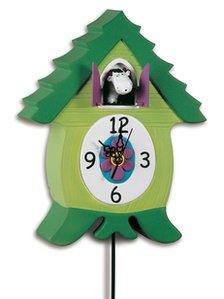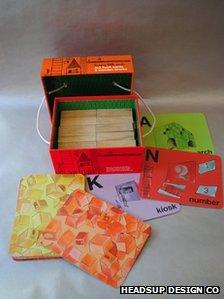Doing Business in China
- Published

Daniel Koval exports his Chinese-made clocks to Europe, the US and Japan
Daniel Koval is the American founder of the Headsup Design Company, which designs toys and gifts, and manufactures them in China for export.
I first went to China in 1990-91. I was working for General Electric, and I visited factories in many parts of China because GE wanted a local partner to manufacture electric motors.
The place was just starting to boom. But you still saw thousands and thousands of bicycles in those days, as opposed to motorcars, and very few Westerners.
In one place I insisted the factory manager take me to a local restaurant. This place was packed full of people eating and smoking.
As soon as I walked in there was suddenly dead silence, then a guy at the back burst out laughing - I looked so out of place.
Later I quit GE, as I always wanted to do something on my own.
I'd had this idea for several years: Wouldn't it be funny to create a clock with a cow coming out of it, and call it a "moo coo clock"?
So, in about 2002, I thought, why not create this product, just for a bit of fun?
I worked with a ceramic designer in London, and model-makers and engineers, to produce a prototype.
I took it to a gift fair in New York and the distributors loved it: How many could I get in a shipping container?
So I took the prototype to China.
One-stop shop
Back then, China couldn't be beaten.
In Guangdong province [neighbouring Hong Kong] you had this whole ecosystem of manufacturers, sub-suppliers, engineers, testing labs and packaging companies.

The company's first export was the Moo Coo Clock
Some very savvy Hong Kong Chinese entrepreneurs had set all these companies up in the 1970s and '80s. For a Westerner, it was like a one-stop shop.
Also, you had support from the government. Credit was easy to get, there was an undervalued currency, and labour was really cheap.
At the beginning, I had to change factory three times. But they were very, very accommodating. In no case was I just dumped and put out on the street.
They felt a responsibility to take care of you, even though they were not going to be working with you any more.
Bankrupt
The business went well. After two or three years we were shipping thousands of these clocks to Europe, the US, Japan, Australia and New Zealand.
In 2008, during the global financial crisis and recession, a factory I was using went bankrupt overnight.
Literally, on Monday I was talking with the marketing manager about meeting at a trade fair, the next day I received a two-line email saying: "This is my last day... "
There was a mad dash to get the tools and the works-in-progress out of the factory, but we were too late.
Within a day, the gate had been locked and that was it. The government seized the contents and auctioned them off to pay the manufacturers' outstanding bills.
It shows that a good relationship in China really is important, to get advance knowledge of these things.
Labour shortages
Conditions are very different in China now, compared with when I started.
Labour rates are going up a lot - as they should. There are severe labour shortages in Guangdong.
Fewer migrant workers come to Guangdong, because they can find work where they live in the interior of China.
And the ones in Guangdong now find office jobs. They have many more options.
Also, the land that these Guangdong factories are sitting on is often worth 10 times the factory.
The local government doesn't really want them there any more. They would rather build a luxury block of flats, so they are less helpful than they used to be.
Also the national government wants more hi-tech, high-value-added manufacturing, so they don't want to help people like me with simple products any more.

Mr Koval moved some manufacturing to Eastern Europe because China had become more expensive
Lots of manufacturers are shifting production to the interior, but the shipping costs are higher, the skills are less, and you don't have the same ecosystem of companies there.
Wooden blocks
Many of the Hong Kong people who set up in Guangdong in the first place are getting ready to retire.
Their sons and daughters have been brought up in very different circumstances to the poverty that their parents grew up in, and often do not want to run their parents' businesses.
The companies are becoming more selective about the work they take on. They are switching to producing for the domestic market.
And when they deal with exporters, they want much better terms, higher prices, and bigger volumes.
A Western company like mine starting out right now would have to search quite a bit to find the right factory.
We recently introduced a new product - wooden blocks with flashcards - but we looked outside China, at Eastern Europe.
In China we found that people were turning us away. They didn't want to take a risk with a new product if they couldn't be sure it would get good volume.
Also, China was not so good, because we would have had to import the wood.
And if we manufacture inside the European Union, we don't have to pay duties, the transport costs are much lower, and we don't have to commit to do an entire container.
China is still a fantastic place to do business, but not the only place any more.
The opinions expressed are those of the author and are not held by the BBC unless specifically stated.
- Published31 October 2012